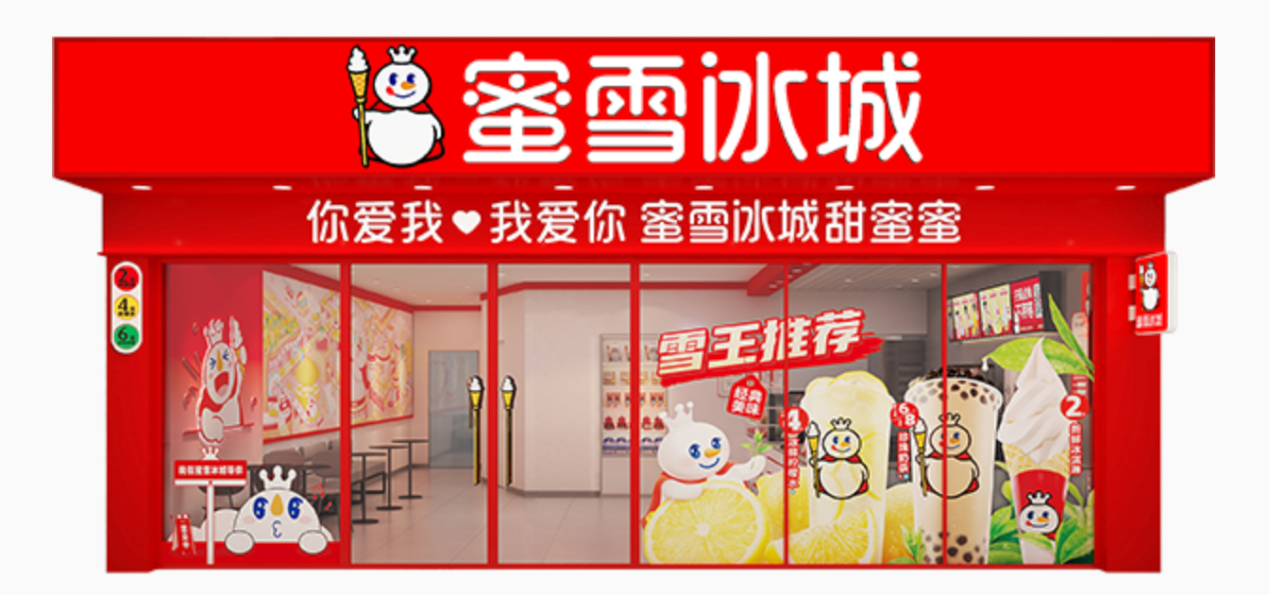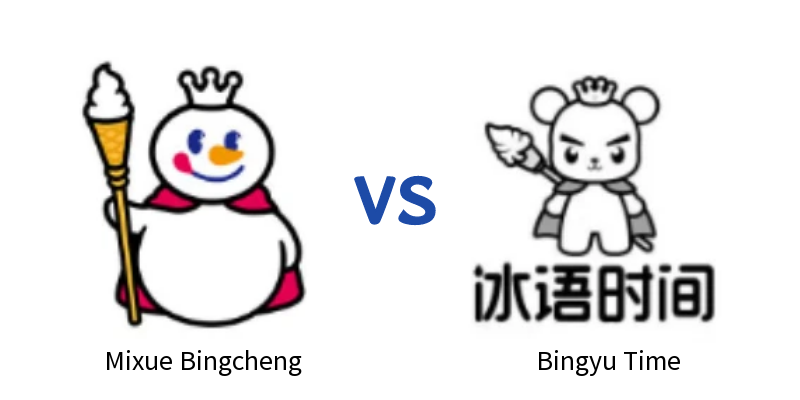
Photo Source: Mixue Bingcheng Official Website
In recent years, with the vigorous development of the new-style tea beverage market, Mixue has rapidly risen with its unique brand image and affordable pricing strategy, becoming a leading enterprise in the domestic fresh tea beverage industry. With its continuously rising brand awareness and market influence, by the end of 2024, Mixue had over 46,000 stores worldwide. However, along with the continuous enhancement of brand value, Mixue has also become a key target for trademark infringement and unfair competition behaviors. In recent years, counterfeit versions of “Mixue” store or its symbolic Snow King logo have not been uncommon, with attempts that tried to confuse consumer cognition by using imitative trademark signs, store decorations, product packaging, etc. similar to Mixue, seeking to unfairly profit from the brand reputation.
On October 17, 2024, the Baiyun District Court of Guangzhou, Guangdong Province, adjudicated a trademark infringement and unfair competition dispute case between Mixue Bingcheng and Zibo Bingyu Company, ruling that Zibo Bingyu Company as the defendant should compensate Mixue Bingcheng over 5 million yuan.
"Mixue Bingcheng" (or well-known as Mixue) is a famous ice cream and tea beverage brand in China, originating from Zhengzhou, Henan Province. Its trademark "Snow King" logo is mainly registered for use in the following categories: International Trademark Classification Classes 35, 43, 30, 32, and 29.
The defendant Zibo Bingyu Time Commercial Trading Co., Ltd. (hereinafter referred to as Bingyu Time when referring to the brand and Zibo Bingyu when referring to the company) is the establisher of "Bingyu Time" stores. Like "Mixue," "Bingyu Time" is also a beverage sales brand, with branch stores distributed across multiple provinces and cities nationwide. By 2023, the number of stores had exceeded 1,700. The trademark logo it owns is also mainly registered for use in International Trademark Classification Classes 35, 43, 30, 32, and 29.
On April 22, 2024, Mixue filed a lawsuit with Baiyun District Court of Guangzhou for believing that the chain stores Bingyu Time operated by the defendants infringed its trademark rights and allegedly constituted unfair competition and to protect its legitimate rights. The plaintiff pointed out that the logo used by the defendants' Bingyu Time stores was highly similar to and can be difficult to distinguish from Mixue's "Snow King" logo. These ‘counterfeit’ logos were actually used on defendants’ goods and services provided, and were widely employed in store fronts, menu boards, product packaging bags, the internet, and other forms of promotional activities. The goods sold and services provided by the defendants were the same as the goods or service categories approved for use by the plaintiff's registered trademarks in question. Though once approved, the defendant’s logos in Class 30, 32, 35, and 43 were finally declared invalid by the National Intellectual Property Administration (CNIPA). Consequently, Mixue argued that Zibo Bingyu’s constituted acts of trademark infringement, which had caused market disorder, damaging the plaintiff's reputation and brand image, reducing the plaintiff's market evaluation.

In addition, the "Mixue" brand is currently globally distributed and is in great popularity. Its store signage design, bar counter decorations, menu boards, employee uniforms, product posters, product packaging design, and other elements have long been familiar to consumers worldwide, forming a unified, distinctive, and highly market-recognizable decoration style and decoration effect. However, as competitor in the beverage industry, who should have been aware of the decoration of Mixue stores with certain influence, Zibo Bingyu still used the same decoration style for the same services, and almost completely copied the aforementioned elements of Mixue. The plaintiff deemed the defendant’s subjective malice as quite obvious, constituting unfair competition.
In response to the above accusations, Zibo Bingyu believed there were insufficient factual and legal bases. Zibo Bingyu argued that the trademarks it used were legally registered, and from perspectives of text composition, pronunciation, visual effects, these trademarks were obviously different from those Mixue’s, thus did not infringe the plaintiff’s trademark right. To make overall evaluation, the two brands were insufficient to cause confusion among ordinary consumers.
Additionally, Zibo Bingyu argued that even if infringement was established, there wasn’t any subjective fault for it to bear compensation liability: firstly, when applying for the allegedly infringing trademark, it had no intention of riding on the plaintiff's brand fame; secondly, when related trademarks were being registered (including the allegedly infringing trademark), though there was objection application raised by the plaintiff, the objection was rejected by CNIPA on the grounds that the constituent elements, visual effects, and overall appearance of both parties’ trademarks had certain differences. If Zibo Bingyu were ordered to bear compensation liability, it would violate the principle of good faith and also damage the market order of fair trading. At the same time, after the plaintiff filed for invalidity declaration, Zibo Bingyu had stopped using the trademark, minimizing the impact to the greatest extent.
After both parties submitted corresponding evidence, the court conducted a detailed trial of the plaintiff’s allegations regarding trademark infringement and unfair competition and ultimately rendered a judgment.
Regarding the trademark infringement alleged by the plaintiff, the court agreed that the allegedly infringing logos were used in the business activities of Defendant Zibo Bingyu’s franchise stores, including store signage, decoration, and packaging boxes and bags of business products, which could directly serve the function and role of distinguishing the source of goods, and could be recognized as trademark use behavior. At the same time, after comparison, the allegedly infringing logos and the plaintiff's registered trademarks in question are both graphic trademarks, with basically the same constituent elements, similar in compositional elements, design methods, and overall visual effects, which were both used on storefront signage, tea beverage cups, straws, and store interior decoration in tea beverage shops.
Combined with the high popularity of the plaintiff's registered trademark in question, this usage method is likely to cause consumer confusion or misidentification, mistakenly believing that the allegedly infringing logo is associated with the plaintiff's trademark. Therefore, the allegedly infringing logo can be recognized as an infringing logo. Though defendant Zibo Bingyu argued that the allegedly infringing logos were once registered trademark and did not constitute infringement, according to Article 47 of the Trademark Law, a registered trademark declared invalid shall be deemed to have never existed from the beginning. The allegedly infringing logos in question have been declared invalid for goods/services in Classes 29, 30, 32, 35, and 43, and should be deemed that the exclusive rights of the aforementioned registered trademarks never existed from the beginning. Therefore, Defendant Zibo Bingyu Company's defense against trademark infringement lacks legal basis.
Regarding the unfair competition alleged by the plaintiff, the court still ruled against the defendant. According to the submitted evidence, as the plaintiff engages in "Mixue" brand store franchise business, while defendant Zibo Bingyu, also engages in "Bingyu Time" brand store franchise business-they are actually in a competitive relationship within the same industry.
Furthermore, according to the actual usage of "Mixue" store decoration provided by the plaintiff, as multiple franchise beverage shops named "Mixue" across the country, distributed over a wide area with a large number of stores, the related goods and service names have gained high popularity and achieved high market recognition. Over time, the popularity of goods and the distinctiveness of decoration have a mutually dependent relationship-when goods have certain popularity, the distinctive decoration of such goods will also be recognized by consumers. Therefore, it can be fully recognized as "decoration with certain influence" stipulated in the Anti-Unfair Competition Law.
After comparison, the store signage and front desk store decoration, employee clothing, packaging bags, and milk tea cup decoration elements of the stores operated by Defendant Zibo Bingyu's franchise operators were basically the same as the decoration elements of the plaintiff's related stores and goods. As practitioners in the same industry, Zibo Bingyu, subjectively had the intention to promote its own goods or services by leveraging the plaintiff's goodwill, thereby improving its popularity. Objectively, it had led to confusion and misidentification by the relevant public regarding the source of services, causing impacts on the plaintiff's legitimate rights and interests. Therefore, the aforementioned behavior of Zibo Bingyu constitutes unfair competition for causing confusion in the source of services, violating the principle of good faith and recognized business ethics.


